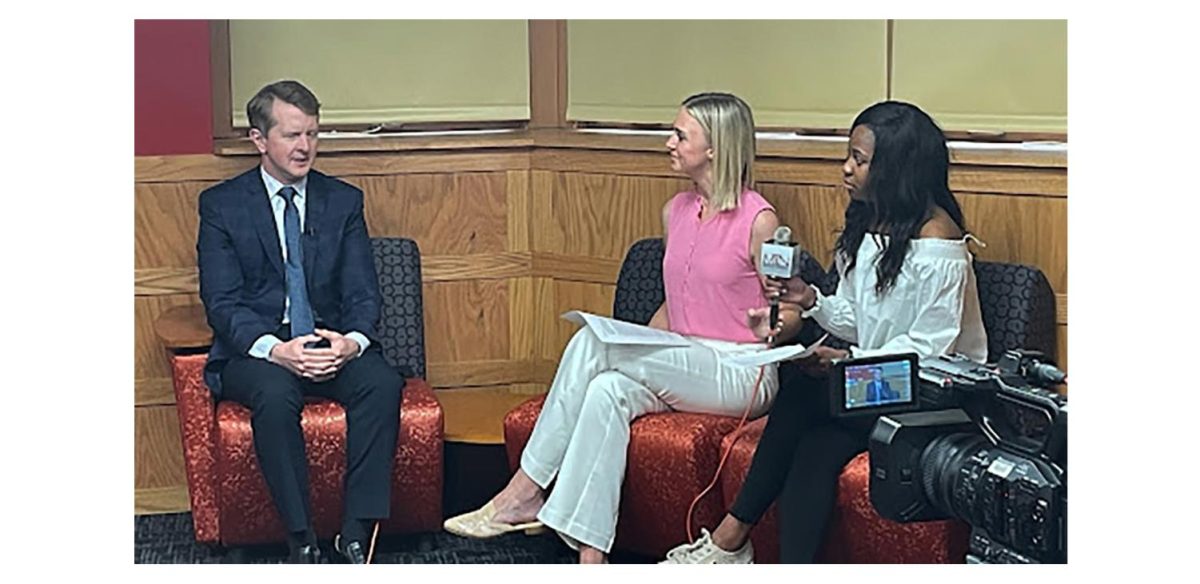Jeopardy! star says world’s a better place when people know things
“Jeopardy!” superstar Ken Jennings discusses the significance of trivia in an interview with Miami Television News reporters prior to his speech for the Miami University Lecture Series on Monday, March 7.
March 11, 2022
“Jeopardy!” co-host and former champion Ken Jennings addressed a crowded audience in Miami University’s Wilks Theater on Monday evening, recounting several lessons that he’s learned from his time with the show to emphasize that trivia “is not trivial.”
Jennings’ 74-game streak on the show in 2004 set a record that is yet to be beaten, meaning he has spent nearly two decades as an iconic figure in the show’s history. He was already a familiar face when he began appearing as the show’s guest host after 37-year host Alex Trebek died in late 2020.
Titled “All the World’s a Jeopardy! Stage,” Jennings’ lecture was the second installment in
Miami’s spring semester Lecture Series. Throughout the talk, he was on a mission to defend the value behind the broad and varied knowledge that made him famous.
“I thought that maybe being the only person to do a particular thing for that length of time had taught me some things,” Jennings said. “What do you actually learn from playing 50 hours of ‘Jeopardy!’ that you didn’t know about yourself? What’s the value of the things we know?”
The curiosity that prompted these questions is the same quality that he says has always pushed him to learn new things. A lifelong fan of the show, he still sees “Jeopardy!” as a unique platform that celebrates that enduring passion.
“[‘Jeopardy!’] reveals something universal about the benefits of knowing things,” Jennings said. “Watching people who seem like curious, lively minds on so many subjects, I think we can just intuitively tell that it’s a better way to live.”
This endorsement of a trait that Jennings always felt “made [him] weird” was one of the things that led him to audition for the show while working as an admittedly unhappy computer programmer. He emphasized throughout his lecture that taking this chance on his interests was one of the most critical life lessons he had taken from the experience.
“Passion can’t be simulated,” he said. “You can always tell whether or not someone is passionate about something. In my case, I was good at writing prose and bad at writing code.”
To Jennings, his field of interest has a significance beyond passion. He spoke about trivia and knowledge as being an important part of a person’s civic duty, a strength that allows them to live confidently as an individual.
“Having the right facts leads to making the right decisions,” Jennings said. “I think we can already see the effects of outsourcing our stuff-knowing to devices. People are less critical when evaluating information on topics like vaccines or climate change. All the anti-science talk starts with an attitude that says, ‘the world is very complex, so I’m just going to know less about it.’ ”
This sentiment is shared by Miami Economics Professor Charles Moul, who appeared on the show in 1998 while earning his doctorate at Northwestern University in Illinois. To Moul, whose relationship with trivia includes founding a quiz bowl team during his time as an undergraduate student at Miami, trivia is a chance for people to showcase their skill in something as significant as well-rounded knowledge.
“We all have so much potential,” Moul said, “and some people use that potential to retain everything they’ve learned as far back as middle school. They’re able to dig deep and produce knowledge at the right moment.”
Like Jennings, Moul dismissed the idea that trivia, especially on “Jeopardy!,” was comprised of inconsequential facts. Remembering his experience on the show, he spoke to a plethora of topics that wouldn’t be unfamiliar in a university environment.
“A lot of the categories [that appear on ‘Jeopardy!’], I wouldn’t consider many of them to be ‘trivia’ in that sense,” Moul said. “I’d consider them to be markings of a well-rounded liberal education.”
Jennings stressed that many of the people who do well on the show are those who are intrinsically well-rounded and curious. Speaking to an audience with a large student population, he encouraged the crowd to use their university environment to embrace a variety of subjects and work to learn something every day. For him, staying curious two decades after his successful streak on the show has tangible benefits.
“In my case, it’s having two teenage kids,” Jennings said. “It annoys them very much if I know memes before they do, so I make sure I’m caught up on all those things just to drive them crazy.”














